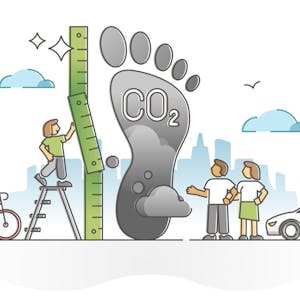In The Sustainability Imperative course, learners embark on a profound journey to comprehend the critical need for sustainable practices and environmental responsibility. Through engaging discussions and interactive assessments, participants explore the macro-level implications of climate change, plastic pollution, and social inequality, while also delving into economic systems and the imperative transition to sustainable development.
The course delves into the definition of sustainability and sustainable development, offering an in-depth understanding of the United Nations' Sustainability Goals. Learners are empowered to engage in meaningful conversations with peers, family, and colleagues to advocate for sustainable living. Additionally, the course elucidates the pivotal role of energy production and the urgent necessity to transition to carbon-free energy technologies to combat climate change.
By the course’s conclusion, participants gain a comprehensive understanding of the implications of their energy consumption patterns and are equipped to make informed decisions to contribute to a more sustainable future.
Certificate Available ✔
Get Started / More Info
The Sustainability Imperative course modules encompass a comprehensive exploration of climate change, sustainable development, and energy transition. Participants engage with macro-level topics, including climate change consequences, greenhouse gases, social equity, and renewable energy technologies.
Learners are introduced to the macro-level view of the current state of the world, understanding the existential threat of climate change and its consequences. Topics include climate change evidence and causes, planetary boundaries, and climate change in personal lives.
This module delves into the mechanisms behind global warming and the greenhouse effect, exploring the increase of greenhouse gases and the need to reduce them by 2030, as agreed in the Paris Climate Agreement.
Participants explore carbon equity and the product lifecycle, gaining insights into sustainability, the United Nations Sustainable Development Goals, and the imperative transition to sustainable development.
Learners investigate the impact of fossil fuels, particularly coal, natural gas, and oil, on climate change. The module also explores the potential of nuclear power and pathways to net zero carbon for power generation.
This module provides a comprehensive understanding of renewable energy technologies, such as hydroelectricity, wind power, solar energy, and energy storage. Participants also evaluate the transition to renewable energy and its economic implications.
Participants engage in a practical assessment of their energy consumption patterns, understanding their utility bills, electricity sources, and calculating their carbon footprint. The module culminates in a reflective assessment of personal energy consumption impact and potential improvements.
Explore the changing Arctic, from its physical geography to the evolving environmental and geopolitical impacts, in the "Arctic Meltdown" course offered...
Climate Change and Water in Mountains: A Global Concern explores the impact of climate change on water resources in mountain regions, addressing risks, adaptation...
How Do We Manage Climate Change? is a comprehensive course covering mitigation and adaptation strategies for addressing climate change.
This advanced course on photovoltaic systems covers solar energy conversion, system design, economic aspects, and more, offering a comprehensive understanding of...